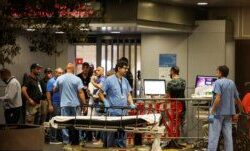Beirut, Lebanon – In the soft hum of a Tuesday afternoon, where life moved through markets and streets swayed with quiet, a sudden violence cracked the air. People carried on as they often do—holding hands, holding onto hope, holding onto little things. But when the buscapersonas in their pockets began to burn, and then burst, the rhythm of the day became a memory of screams. The explosions, carefully timed, swept through parts of Lebanon and Syria, claiming nine souls, including a little girl of eight who will never again skip through the streets of her childhood.
The devices, simple pagers—once symbols of communication, now twisted into weapons—ripped through the heart of a people already long familiar with struggle. The militant group Hezbollah, always standing on the edge of war, pointed its finger at Israel, accusing them of orchestrating a deliberate and deadly remote attack on their communication networks. Yet, the story doesn’t begin nor end with Hezbollah. Far away, across the seas, in the quiet corners of Budapest, a company was making buscapersonas designed not to harm, but to connect. And somewhere in Taiwan, another firm had put its mark on these very devices, unaware of the death they would later carry.
The Tools of War, Born in Factories Far from the Battle
Gold Apollo, a Taiwanese company, came forward on Wednesday to acknowledge that they had licensed their brand to the devices used in these attacks, but quickly clarified that the pagers themselves—those pagers that would one day tear lives apart—were crafted not by their hands, but by a Hungarian company named BAC Consulting KFT. The agreement, they explained, was one of business, not blood. They allowed BAC to use their name, to sell their products across certain regions, but the design and construction of the devices, that was BAC’s doing.
It is a strange thing, how the innocent tools of everyday life—things that might otherwise gather dust in someone’s drawer—can be made into agents of death. The AR-924 pagers were not built for battle, and yet on that Tuesday, they were used in what seems like a well-planned Israeli operation aimed at Hezbollah. These pagers, now symbols of loss, exploded almost in unison across the southern suburbs of Beirut, the Beqaa Valley, and Damascus, targeting areas where Hezbollah’s roots grow deep.
The Human Cost Behind the Headlines
Amid the rubble and the blood, there were not just militants. Among the chaos lay the bodies of civilians, and though Hezbollah may have been the intended target, war does not discriminate. A young girl, barely old enough to understand the weight of the world she lived in, became one of its casualties. As smoke cleared from the streets and silence took hold again, nearly 3,000 people lay wounded, their lives forever changed, their futures now cast in uncertainty.
What does it mean to be caught in the storm of violence not of your making? What does it mean to carry in your pocket the very thing that might one day undo you? These questions linger in the minds of many across Lebanon and Syria, where grief has become a constant companion.
Israel’s Silence, Hezbollah’s Rage
Israel, who rarely speaks of such operations, informed the U.S. government of its actions only after the fact. Their silence on the matter is a silence well-practiced. Meanwhile, Hezbollah, enraged and defiant, issued a statement vowing to continue their fight against Israel as they always have—standing as a force beside Hamas and the people of Gaza. They speak of resistance, of struggle, but for the families burying their dead, no words of war can quiet their sorrow.
Manufactured Elsewhere, But Felt Everywhere
The world is interconnected in ways we often forget. A pager built in Budapest, licensed by a company in Taiwan, can find itself in the middle of a battlefield, thousands of miles away. And in that battlefield, lives can be lost, lives that may never have heard of Gold Apollo or BAC Consulting KFT. In those distant factories, no one could have imagined that their products would one day explode in the hands of innocents. But that is the nature of war—it takes what is ordinary and turns it into tragedy.
Hezbollah’s accusations against Israel are heavy, but the story here is not just of governments or military tactics. It is the story of a mother who will now light a candle for a child lost, of a man who will carry the scars of this day long after the world moves on. It is a story of a Tuesday afternoon, interrupted by the cruel unpredictability of violence.
Shadows in the Streets, the Echoes of War
The American University of Beirut Medical Center (AUBMC) still holds the silence of that day. Empty stretchers and crowded waiting rooms tell the tale of the wounded and those who did not make it. As the sun set on September 17, 2024, the streets of Beirut and Damascus were stained, not just with blood, but with the weight of a conflict that has no end in sight.
For those who live through such moments, history is not something found in books. It is etched in their hearts, in the scars on their skin, in the empty seats at their tables. And while the world debates over the who and why of this attack, those left behind must carry on, somehow, in a world where even the smallest things—like a pager—can become an instrument of destruction.


